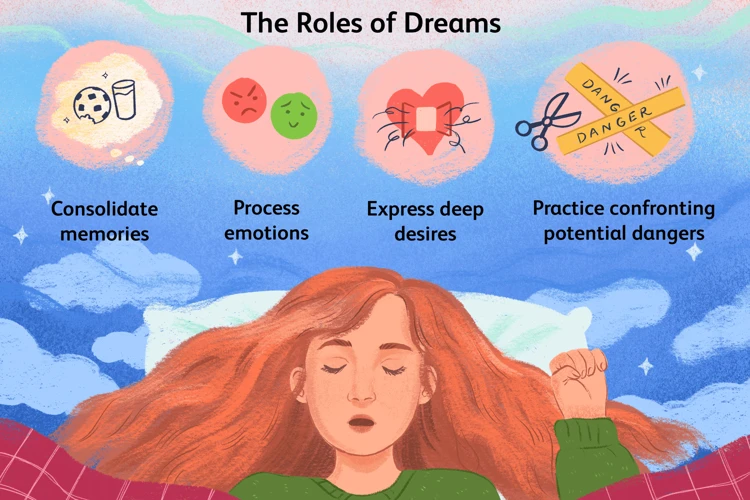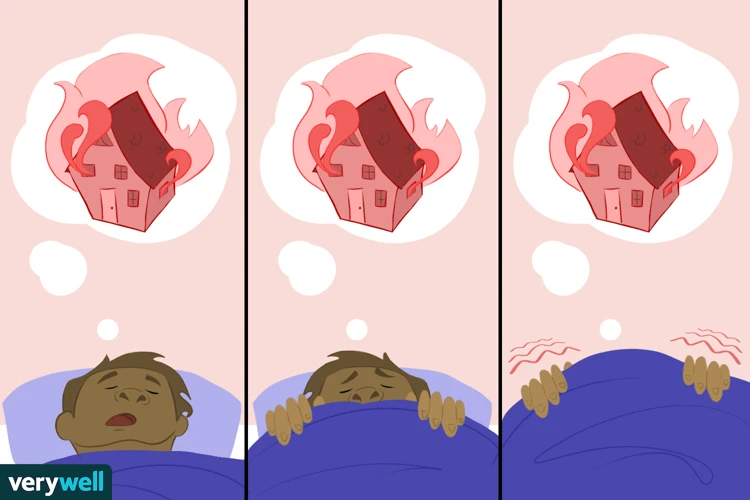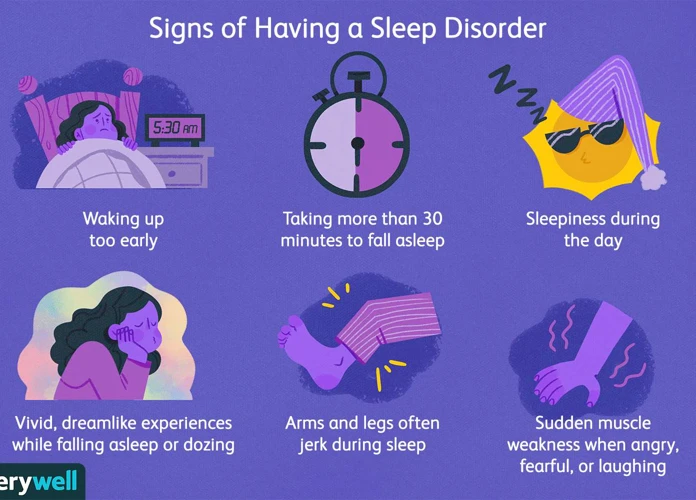Have you ever woken up from a terrifying nightmare, drenched in sweat and trying to catch your breath? Nightmares can be distressing, but did you know that they can often be linked to sleep disorders? Sleep disorders are more than just trouble falling asleep or staying asleep; they can have a significant impact on our overall well-being. Understanding the role of sleep disorders in frequent nightmares is crucial for finding effective solutions. In this article, we will delve into the relationship between sleep disorders and nightmares, explore common sleep disorders associated with nightmares, and learn how these disorders influence dreams and overall sleep quality. So, if you’re tired of being plagued by disturbing dreams, read on to uncover the mysteries behind sleep disorders and their connection to frequent nightmares.
The Significance of Sleep Disorders

Sleep disorders play a significant role in our overall health and well-being. They encompass a range of conditions that disrupt our sleep patterns and can have a profound impact on various aspects of our lives. Definition of Sleep Disorders: Sleep disorders are classified as medical conditions that affect the quantity and quality of sleep a person gets. These disorders can include insomnia, sleep apnea, narcolepsy, restless leg syndrome, and more. Each disorder has its own unique symptoms and characteristics that contribute to disrupted sleep. Prevalence and Impact: Sleep disorders are prevalent worldwide and can affect people of all ages. They can have far-reaching effects on physical, mental, and emotional health. Sleep deprivation caused by these disorders can lead to daytime drowsiness, difficulty concentrating, irritability, and impaired cognitive function. Sleep disorders have been linked to various health problems such as obesity, diabetes, cardiovascular disease, and an increased risk of accidents. Recognizing the significance of sleep disorders is crucial for understanding their impact on our overall well-being and seeking appropriate treatment. /impact-medication-dream-content-nightmares/
Definition of Sleep Disorders
When it comes to understanding sleep disorders, it is important to have a clear definition of what they entail. Sleep disorders encompass a wide range of conditions that affect the quality and quantity of sleep. Here are a few key sleep disorders:
1. Insomnia: Insomnia is characterized by difficulty falling asleep, staying asleep, or both. It can be caused by a variety of factors such as stress, anxiety, medication, or underlying health conditions.
2. Sleep Apnea: Sleep apnea is a disorder where breathing repeatedly stops and starts during sleep. This interruption in breathing can lead to snoring, gasping, and disrupted sleep patterns.
3. Narcolepsy: Narcolepsy is a neurological disorder that affects the brain’s ability to regulate sleep-wake cycles. It is characterized by excessive daytime sleepiness, sudden loss of muscle tone (cataplexy), hallucinations, and sleep paralysis.
4. Restless Leg Syndrome: Restless Leg Syndrome is characterized by an uncontrollable urge to move one’s legs, often accompanied by uncomfortable sensations. This can make it difficult to fall asleep or stay asleep.
5. REM Behavior Disorder: REM Behavior Disorder involves acting out vivid and often violent dreams during REM sleep. People with this disorder may talk, shout, kick, or punch while asleep.
Each of these sleep disorders has its own unique set of symptoms and treatment options. It is important to consult with a healthcare professional for an accurate diagnosis and appropriate treatment plan. Recognizing and addressing sleep disorders can significantly improve sleep quality and overall well-being.
Prevalence and Impact
The prevalence and impact of sleep disorders are significant and can affect individuals of all ages. Let’s explore some key points:
1. Insomnia: Insomnia is one of the most common sleep disorders, affecting millions of people worldwide. It is characterized by difficulty falling asleep, staying asleep, or experiencing poor sleep quality. Insomnia can lead to daytime fatigue, impaired concentration, and reduced productivity. Treatment options for insomnia include lifestyle changes, therapy, and medications.
2. Sleep Apnea: Sleep apnea is a disorder in which breathing repeatedly stops and starts during sleep. It can have serious consequences, including increased risk of cardiovascular problems, stroke, and even death. Continuous Positive Airway Pressure (CPAP) therapy is a common treatment for sleep apnea.
3. Narcolepsy: Narcolepsy is a neurological disorder that causes excessive daytime sleepiness and sudden episodes of sleep. People with narcolepsy may also experience hallucinations and loss of muscle control during sleep. The disorder can significantly impact daily functioning and may require medication and lifestyle adjustments for management.
4. Restless Leg Syndrome (RLS): RLS is characterized by an uncontrollable urge to move one’s legs, often accompanied by uncomfortable sensations. This disorder can disrupt sleep and lead to daytime fatigue and impaired quality of life. Treatment options for RLS include medication and lifestyle changes.
Understanding the prevalence of these sleep disorders is crucial for seeking appropriate diagnosis and treatment. If you suspect you or someone you know may be experiencing a sleep disorder, it is important to consult with a healthcare professional for proper evaluation and guidance. /nightmares-in-children-concern
The Relationship between Sleep Disorders and Nightmares

The relationship between sleep disorders and nightmares is complex and interconnected. Understanding Nightmares: Nightmares are vivid and disturbing dreams that can often cause intense fear, anxiety, and even awaken the person from sleep. They are more common in children but can also affect adults. Nightmares usually occur during the REM (Rapid Eye Movement) stage of sleep, which is when most dreaming takes place. The Connection with Sleep Disorders: Sleep disorders can contribute to the occurrence of nightmares. For example, individuals with insomnia may have difficulty falling asleep or staying asleep, leading to fragmented sleep patterns. This disruption in sleep can increase the likelihood of experiencing vivid and unsettling dreams, including nightmares. Additionally, sleep disorders such as sleep apnea or restless leg syndrome can cause frequent awakenings throughout the night, further interrupting the normal sleep cycle and potentially triggering nightmares. It is important to address and treat sleep disorders in order to reduce the occurrence of nightmares and improve overall sleep quality. /nightmares-in-children-concern/
Understanding Nightmares
: Nightmares are vivid and disturbing dreams that can cause intense fear, anxiety, and distress. They often occur during rapid eye movement (REM) sleep, which is a stage of sleep associated with heightened brain activity and vivid dreaming. Nightmares can be characterized by a variety of themes, such as being chased, falling, or experiencing a traumatic event. These dreams can feel incredibly real, and upon waking, individuals may experience lingering feelings of fear and anxiety. Nightmares can occur in both children and adults, although their frequency and content may vary. While the exact cause of nightmares is not fully understood, they are believed to be influenced by a combination of factors, including stress, trauma, sleep deprivation, and certain medications. It is important to note that occasional nightmares are considered normal, but frequent nightmares that significantly disturb sleep and daily functioning may indicate underlying issues that need to be addressed. /nightmare-foods-avoid-before-bed/
The Connection with Sleep Disorders
The relationship between sleep disorders and nightmares is complex yet interconnected. Sleep disorders can contribute to the frequency and intensity of nightmares experienced by individuals. Understanding Nightmares: Nightmares are vivid, disturbing dreams that can cause fear, anxiety, and a strong emotional response during sleep. They often involve threatening or distressing situations, and upon waking, individuals may experience a lingering sense of unease. : Sleep disorders can disrupt the normal sleep cycle and lead to an imbalance in REM (rapid eye movement) sleep, which is the stage of sleep associated with intense dreaming. For example, individuals with insomnia may have difficulty falling asleep or staying asleep, leading to sleep deprivation and an increased likelihood of experiencing nightmares. Similarly, sleep apnea, which involves interruptions in breathing during sleep, can also disrupt the sleep cycle and contribute to nightmare occurrence. Other sleep disorders, such as narcolepsy and REM behavior disorder, are also known to be associated with frequent nightmares. By addressing and treating the underlying sleep disorder, individuals may experience a reduction in the frequency and intensity of their nightmares, leading to improved sleep quality and overall well-being.
Common Sleep Disorders Associated with Nightmares

When it comes to nightmares, several common sleep disorders have been associated with their occurrence. These disorders can disrupt our sleep patterns and contribute to the vivid and distressing nature of our dreams. Insomnia is one such disorder, characterized by difficulty falling asleep or staying asleep. Insomnia can lead to fragmented sleep and increased REM sleep, which is associated with intense dreaming. Another sleep disorder commonly linked to nightmares is Narcolepsy. This neurological disorder is characterized by excessive daytime sleepiness and sudden episodes of sleep. Narcolepsy can disrupt the normal sleep-wake cycle, leading to abnormal REM sleep and vivid dream experiences. Sleep Apnea, a condition in which breathing repeatedly stops and starts during sleep, can also contribute to nightmares. The interrupted breathing patterns and oxygen deprivation associated with sleep apnea can disrupt sleep and lead to intense and vivid dreams. Additionally, REM Behavior Disorder (RBD), a parasomnia disorder in which individuals act out their dreams, can result in violent or unsettling dream-related behaviors. Understanding these common sleep disorders associated with nightmares is essential for identifying the underlying causes and seeking appropriate treatment.
Insomnia
Insomnia is one of the most common sleep disorders, characterized by difficulty falling asleep, staying asleep, or experiencing non-restorative sleep. Symptoms of Insomnia can include persistent trouble initiating or maintaining sleep, waking up too early in the morning, feeling tired upon waking, and experiencing poor quality sleep. Insomnia can be caused by various factors, including stress, anxiety, depression, certain medications, caffeine or stimulant use, and underlying medical conditions. The Impact of Insomnia on Nightmares is significant, as it can increase the frequency and intensity of nightmares. When individuals struggle to fall asleep or experience fragmented sleep due to insomnia, their REM sleep cycles, which are associated with dreaming, can be disrupted. This can lead to vivid and disturbing dreams or nightmares. It is believed that the heightened arousal, anxiety, and emotional distress associated with insomnia contribute to the occurrence of nightmares. The fatigue and sleep deprivation that result from chronic insomnia can further increase the likelihood of experiencing nightmares. If you want to learn more about the relationship between medication and nightmares, you can read our article on /impact-medication-dream-content-nightmares/.
Narcolepsy
is a neurological sleep disorder characterized by excessive daytime sleepiness and sudden bouts of uncontrollable sleep during the day. People with narcolepsy often experience sudden sleep attacks, where they can fall asleep at inappropriate times and in inappropriate places. These sleep attacks can occur multiple times a day and can be accompanied by other symptoms such as cataplexy, which is a sudden loss of muscle tone triggered by intense emotions. Individuals with narcolepsy may also experience sleep paralysis, where they are temporarily unable to move or speak while falling asleep or waking up. Additionally, they may have vivid dreams that occur during the transition between wakefulness and sleep. Narcolepsy can significantly impact daily functioning, as individuals may struggle to stay awake and alert during school or work hours. It can also affect their social life and relationships, as they may feel embarrassed or self-conscious about their symptoms. Treatment for narcolepsy typically involves a combination of medications, lifestyle adjustments, and support from healthcare professionals. It is important for individuals with narcolepsy to seek proper diagnosis and management to improve their quality of life.
Sleep Apnea
Sleep apnea is a common sleep disorder characterized by interruptions in breathing during sleep. This condition can have a significant impact on a person’s sleep quality and overall health. There are three main types of sleep apnea: obstructive sleep apnea (OSA), central sleep apnea (CSA), and complex sleep apnea syndrome (CSAS).
Obstructive Sleep Apnea (OSA): OSA occurs when the muscles in the throat relax and obstruct the airway, leading to breathing pauses or shallow breaths during sleep. This can cause loud snoring, choking, or gasping sounds. OSA is often accompanied by daytime sleepiness, morning headaches, and difficulty concentrating. It is more common in individuals who are overweight or obese. Treatment options for OSA include lifestyle changes, such as weight loss, positional therapy, continuous positive airway pressure (CPAP) therapy, and in some cases, surgery.
Central Sleep Apnea (CSA): CSA is less common and occurs when the brain fails to send appropriate signals to the muscles that control breathing. This results in pauses in breathing that can last for seconds or even minutes. CSA is often associated with underlying medical conditions such as heart failure, stroke, or certain neurological disorders. Treatment for CSA involves addressing the underlying condition.
Complex Sleep Apnea Syndrome (CSAS): CSAS is a combination of both obstructive and central sleep apnea. It is also known as treatment-emergent central sleep apnea. This occurs when the use of CPAP therapy for OSA causes the development of central sleep apnea. Treatment for CSAS involves adjusting CPAP settings or exploring alternative therapies.
Sleep apnea is a serious sleep disorder that can impact both physical and mental health. It is important to recognize the symptoms and seek medical evaluation if sleep apnea is suspected. Treatment for sleep apnea can vary depending on the type and severity of the condition, but it often involves lifestyle changes, the use of breathing devices such as CPAP machines, or surgical interventions if necessary. It is essential to address sleep apnea to improve sleep quality, reduce the risk of complications, and enhance overall well-being.
REM Behavior Disorder
REM Behavior Disorder (RBD) is a sleep disorder characterized by the loss of paralysis during the rapid eye movement (REM) stage of sleep. During REM sleep, our brains are highly active, and most vivid dreaming occurs. Typically, our bodies are immobile and in a state of muscle atonia to prevent us from acting out our dreams. However, individuals with RBD experience a disruption in this muscle atonia, leading to physical movements and behaviors during sleep. These behaviors can range from simple limb twitches to complex, violent actions, such as kicking, punching, or even jumping out of bed. RBD can be quite alarming, not only for the person experiencing it but also for their sleep partners who may witness these intense movements. The exact cause of RBD is still unknown, but it is believed to be associated with neurodegenerative disorders such as Parkinson’s disease. Diagnosis of RBD involves comprehensive sleep evaluations, including polysomnography, which records brain activity, eye movements, muscle tone, and breathing patterns during sleep. Treatment for RBD may involve medication to suppress muscle activity during sleep and improve safety. It is crucial to manage RBD effectively to prevent injuries and ensure a restful sleep for individuals affected by this disorder.
How Sleep Disorders Influence Dreams and Nightmares

Sleep disorders have a profound influence on our dreams and nightmares. Here are a few key ways in which sleep disorders can impact our dream experiences:
Disrupted Sleep Patterns and REM Cycles: Sleep disorders often disrupt the natural sleep patterns, including the Rapid Eye Movement (REM) stage of sleep. REM sleep is the stage during which most dreaming occurs. When sleep is interrupted or fragmented due to sleep disorders like insomnia or sleep apnea, it can lead to an imbalance in the duration and intensity of REM sleep. This disruption can result in more intense and vivid dreams, including nightmares.
Increased Dream Intensity: Sleep disorders can cause an increase in dream intensity. Studies have shown that individuals with sleep disorders tend to have more emotionally charged dreams compared to those without sleep disturbances. The heightened emotional intensity can contribute to the occurrence of nightmares, as the negative emotions experienced during the dream state may be more intense and distressing.
Imbalance in Neurochemicals: Sleep disorders can disrupt the balance of neurochemicals in our brains that regulate sleep and dream processes. For instance, in individuals with insomnia, there may be an overabundance of stress-related neurotransmitters, such as cortisol, which can influence dream content and lead to more frequent nightmares. Similarly, disorders like narcolepsy, which involve dysfunction in the brain’s regulation of sleep-wake cycles, can also impact dream experiences.
Sleep disorders can significantly influence dreams and nightmares. Disrupted sleep patterns and REM cycles, increased dream intensity, and imbalances in neurochemicals all contribute to the occurrence of nightmares in individuals with sleep disorders. Understanding these influences is essential for finding effective ways to manage and alleviate the frequency and intensity of nightmares associated with sleep disturbances.
Disrupted Sleep Patterns and REM Cycles
Disrupted sleep patterns and REM cycles are key factors in understanding the influence of sleep disorders on dreams and nightmares. Sleep disorders often interrupt the normal progression of sleep stages, particularly the Rapid Eye Movement (REM) stage. During REM sleep, our brains are highly active, and this is when most dreaming occurs. Insomnia: Individuals with insomnia frequently struggle to fall asleep or maintain sleep throughout the night, leading to fragmented sleep and decreased REM sleep. Narcolepsy: Narcolepsy is a neurological disorder characterized by excessive daytime sleepiness and sudden attacks of sleep. These episodes can disrupt the normal sleep cycle, leading to irregular REM sleep patterns. Sleep apnea: Sleep apnea is a condition in which a person’s breathing repeatedly stops and starts during sleep. These disruptions can lead to fragmented sleep and a decrease in REM sleep duration. REM Behavior Disorder: REM Behavior Disorder is a disorder where individuals act out their dreams physically. This can result in disrupted sleep patterns and lead to a higher chance of experiencing nightmares. The disruption of REM sleep and sleep continuity caused by these sleep disorders can alter the normal process of dream formation and increase the likelihood of nightmares occurring. Understanding the impact of disrupted sleep patterns and REM cycles is essential in comprehending the connection between sleep disorders and nightmares.
Increased Dream Intensity
One of the ways sleep disorders influence dreams and nightmares is by increasing dream intensity. When individuals suffer from sleep disorders, such as insomnia or sleep apnea, it disrupts the normal sleep cycle and REM (Rapid Eye Movement) sleep, which is the stage of sleep where most vivid dreaming occurs. As a result, when individuals with sleep disorders finally do fall asleep, their dreams may be more intense and vivid than usual. This heightened dream intensity can contribute to the occurrence of nightmares. These nightmares can be more realistic and emotionally charged, causing feelings of fear, anxiety, and even trauma upon waking. Individuals may also experience recurring nightmares due to the disruption in their sleep patterns. The increased dream intensity associated with sleep disorders further highlights the complex relationship between sleep and dreaming, and the significant role that sleep disorders play in influencing the content and emotional impact of our nightmares.
Imbalance in Neurochemicals
Research suggests that an imbalance in neurochemicals can contribute to the development of sleep disorders and the occurrence of nightmares. Neurochemicals are substances in the brain that play a crucial role in regulating sleep, mood, and emotions. When there is an imbalance in these neurochemicals, it can disrupt the normal sleep-wake cycle and lead to disturbances in dreaming. Specific Neurotransmitters: Various neurotransmitters, such as serotonin, dopamine, and norepinephrine, are involved in regulating sleep and dreaming. Changes in the levels of these neurotransmitters can affect the content and intensity of dreams. For example, low levels of serotonin have been associated with increased negative emotions and vivid nightmares. Hormonal Factors: Hormones also play a role in sleep and dreaming. Fluctuations in hormone levels, such as cortisol and melatonin, can disrupt the sleep cycle and impact dream patterns. Elevated cortisol levels, often seen in individuals with stress or anxiety, can lead to more intense and disturbing dreams. Psychological Factors: Psychological factors, such as anxiety, depression, and trauma, can also contribute to an imbalance in neurochemicals and increase the likelihood of sleep disorders and nightmares. These psychological factors can disrupt the normal functioning of neurotransmitters and hormones, further exacerbating sleep disturbances. Understanding the role of neurochemical imbalances in sleep disorders and nightmares can help in developing targeted treatments and interventions to restore a healthier sleep cycle.
Impact on Overall Sleep Quality and Daily Functioning
The impact of sleep disorders on overall sleep quality and daily functioning cannot be understated. When sleep is constantly disrupted or of poor quality, it can have detrimental effects on various aspects of our lives. Effects on Mental and Emotional Well-being: Sleep disorders can contribute to the development or worsening of mental health conditions such as anxiety and depression. Lack of quality sleep can lead to increased irritability, mood swings, difficulty managing stress, and a decreased ability to regulate emotions. Additionally, sleep deprivation can impair memory and cognitive function, making it harder to concentrate and perform tasks effectively. Interference with Daily Activities: The effects of sleep disorders can extend beyond nighttime. Fatigue and daytime sleepiness can make it challenging to engage in daily activities, whether it’s work, school, or personal responsibilities. It can affect productivity, performance, and overall quality of life. Concentration and decision-making abilities may be compromised, leading to potential accidents or errors. Recognizing the impact of sleep disorders on overall sleep quality and daily functioning is crucial for seeking appropriate treatment, improving sleep habits, and enhancing overall well-being.
Effects on Mental and Emotional Well-being
The effects of sleep disorders on mental and emotional well-being are profound. Lack of quality sleep can lead to a range of mental health issues and emotional disturbances. Mood Disorders: Sleep disorders can contribute to the development or exacerbation of mood disorders such as depression and anxiety. The constant fatigue and disrupted sleep patterns can affect emotional stability and increase feelings of irritability, sadness, and worry. Cognitive Impairment: Sleep disorders can impair cognitive function, including memory, attention, and problem-solving abilities. Sleep-deprived individuals may experience difficulties with concentration, learning, and decision-making. Psychological Distress: Chronic sleep deprivation can lead to heightened levels of psychological distress, including feelings of overwhelm, hopelessness, and a decreased ability to cope with daily stressors. Impaired Emotional Regulation: Sleep disorders can disrupt the brain’s ability to regulate emotions effectively. This can result in mood swings, emotional instability, and difficulty managing stress. Lowered Quality of Life: The cumulative impact of these mental and emotional effects can significantly diminish one’s overall quality of life, affecting relationships, work performance, and self-esteem. It is essential to recognize the psychological toll that sleep disorders can have and seek appropriate treatment to improve mental and emotional well-being.
Interference with Daily Activities
Interference with daily activities is a significant consequence of sleep disorders. When individuals do not get sufficient restorative sleep due to these disorders, it can significantly impact their ability to function during the day. Effects on Mental and Emotional Well-being: Lack of quality sleep can lead to mood disturbances such as irritability, anxiety, and depression. It can also impair cognitive function, making it challenging to concentrate, learn, and make decisions. Memory problems and decreased productivity are common among those with sleep disorders. Additionally, the emotional toll of sleep deprivation can strain relationships and negatively affect overall well-being. : Sleep disorders can make it difficult to perform normal daily tasks effectively. Fatigue and excessive daytime sleepiness can impair job performance, affect academic success, and hinder personal relationships. Simple activities such as driving, participating in hobbies, and carrying out household chores become more challenging and dangerous when individuals are sleep deprived. Interference with daily activities due to sleep disorders can have a profound impact on an individual’s quality of life. It is crucial to address and manage these disorders to regain optimal functioning and well-being. /nightmares-in-children-concern/
Conclusion
In conclusion, sleep disorders have a profound impact on our sleep quality and can contribute to the occurrence of frequent nightmares. Understanding the relationship between sleep disorders and nightmares is crucial in finding effective solutions to alleviate these distressing experiences. Sleep disorders such as insomnia, narcolepsy, sleep apnea, and REM behavior disorder are commonly associated with nightmares. These disorders disrupt our sleep patterns and can lead to increased dream intensity and imbalances in neurochemicals, which contribute to the occurrence of nightmares. The impact of sleep disorders extends beyond just our sleep quality; it affects our overall mental and emotional well-being, as well as our daily functioning. It’s important to seek professional help if you suspect you have a sleep disorder, as proper diagnosis and treatment can significantly improve your sleep quality and minimize the occurrence of nightmares. By addressing sleep disorders, we can enhance our overall sleep quality and regain peaceful and restorative nights. So, don’t let sleep disorders continue to haunt your dreams, take the necessary steps to improve your sleep and bid farewell to frequent nightmares.
Frequently Asked Questions
1. Are sleep disorders common?
Yes, sleep disorders are quite common. In fact, it is estimated that about 70 million Americans suffer from some form of sleep disorder.
2. Can sleep disorders cause nightmares?
Yes, sleep disorders can contribute to frequent nightmares. Conditions such as insomnia, narcolepsy, and sleep apnea have been linked to an increased risk of experiencing nightmares.
3. What is insomnia?
Insomnia is a sleep disorder characterized by difficulty falling asleep, staying asleep, or both. It can lead to sleep deprivation and a variety of negative effects on a person’s daily functioning.
4. How does sleep apnea affect sleep quality?
Sleep apnea is a disorder that causes interruptions in breathing during sleep, leading to frequent arousals throughout the night. These disruptions can greatly impact the quality of sleep and contribute to the occurrence of nightmares.
5. What is narcolepsy?
Narcolepsy is a neurological disorder that affects the brain’s ability to regulate sleep-wake cycles. People with narcolepsy often experience excessive daytime sleepiness and may abruptly fall asleep during the day.
6. Can medications contribute to nightmares?
Yes, certain medications, such as antidepressants, can sometimes lead to vivid and intense dreams, including nightmares. Discussing any concerns about medication side effects with a healthcare professional is important.
7. How do sleep disorders influence dream intensity?
Sleep disorders can disrupt the normal sleep architecture and cause imbalances in neurochemicals involved in dreaming. As a result, dreams, including nightmares, may become more intense and memorable.
8. Can children experience nightmares due to sleep disorders?
Yes, sleep disorders can also impact children and cause nightmares. It is important to address any sleep-related concerns in children to ensure their overall well-being and quality of sleep.
9. Can changing my diet help reduce nightmares associated with sleep disorders?
While there is no direct evidence linking specific foods to nightmares associated with sleep disorders, maintaining a healthy diet and avoiding heavy meals before bedtime can contribute to better overall sleep quality.
10. How can treating sleep disorders improve the frequency of nightmares?
By effectively managing and treating sleep disorders, such as through behavioral changes, therapy, or medication, individuals may experience improved sleep quality, reduced nightmares, and an overall improvement in their well-being.








